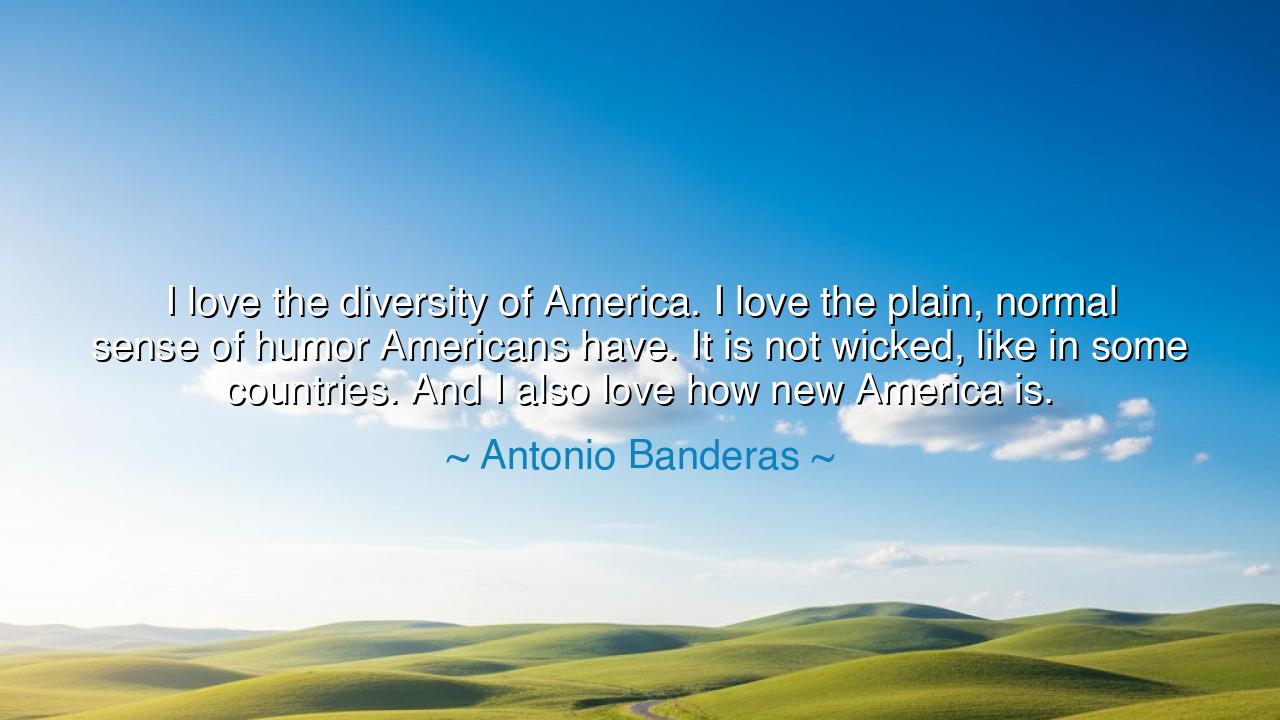
I love the diversity of America. I love the plain, normal sense
I love the diversity of America. I love the plain, normal sense of humor Americans have. It is not wicked, like in some countries. And I also love how new America is.






In the heartfelt and reflective words of Antonio Banderas, we hear the admiration of a traveler who has looked upon many lands and found beauty in their contrasts: “I love the diversity of America. I love the plain, normal sense of humor Americans have. It is not wicked, like in some countries. And I also love how new America is.” These words, spoken by a man who has journeyed from the ancient cities of Spain to the restless heart of the New World, carry with them not only affection, but insight — the recognition that every nation is shaped by its spirit, and that America’s spirit, though young, is vast, curious, and radiant in its variety.
When Banderas speaks of diversity, he speaks not merely of color, language, or creed, but of the living mosaic that gives the nation its character. To him, America is not a single song but a symphony — a place where a thousand stories meet, mingle, and become one. It is a land that invites the foreigner not to erase himself, but to contribute to the whole. In the ancient world, the philosopher Herodotus traveled among nations and wrote that strength comes not from sameness, but from multiplicity — for it is diversity that sharpens the mind, that widens the heart, that gives civilization both color and endurance. So it is with America, whose power lies not in uniformity, but in the harmony of differences.
Yet Banderas sees in this nation not only diversity, but a particular humor, a way of being that reveals the innocence and openness of a new people. “It is not wicked,” he says — meaning that it lacks the bitterness, the cynicism, and the cutting edge often found in the older worlds of Europe. For centuries, humor in the Old World was sharpened by history’s iron — by wars, betrayals, and ancient rivalries. In the taverns of London, the plays of Shakespeare laughed at folly but also pierced the heart; in the salons of Paris, wit was a duel as much as a delight. But in America, humor became something else — a kind of sunlight, born from hope, equality, and renewal. It is a humor of shared humanity, not mockery; of self-deprecation, not cruelty.
One might think of Mark Twain, the great humorist of the American soul, who could make the people laugh even as he made them think. His humor was plain and normal, as Banderas calls it — the humor of the river, the town, the worker, the dreamer. It did not strike down the weak; it lifted the ordinary to the level of art. This, perhaps, is what Banderas means when he says he loves the sense of humor of America — that it belongs to everyone, that it springs from the democratic heart, untainted by the need to wound. In this laughter, he sees the freshness of a culture still finding itself, still innocent enough to laugh at its own reflection.
And then he speaks of the newness of America — that bright and restless energy that astonishes those who come from older lands. To be “new,” in this sense, is not to lack wisdom, but to carry the courage of beginnings. The ancient nations of Europe, built upon centuries of memory, often carry the weight of their pasts; but America, being young, carries instead the freedom to invent. To one like Banderas, whose homeland walks on the bones of empires and cathedrals, this youth is both strange and beautiful. It is a nation still writing its epic, still daring to dream as if history were an open sky. The newness that he loves is not naivety, but possibility — the boundless promise of what can yet be.
History, too, has shown that the strength of the new lies in its openness to the world. When the scholar Alexis de Tocqueville came to America in the 1830s, he too was astonished by what he found — a people unburdened by ancient hierarchies, who spoke freely, worked earnestly, and believed deeply in the future. He saw a society built not on aristocracy but on spirit, not on tradition but on the daring of innovation. This is the America that Banderas praises: not perfect, but alive — a work in progress, rich with diversity, guided by humor, and driven by youth’s eternal hunger for creation.
So let this be the lesson, O listener: learn to love diversity, for it is the lifeblood of any enduring people. Embrace a sense of humor that is kind, not cruel — laughter that unites rather than divides. And cherish the newness within yourself — for every person, like every nation, must remain young in spirit, willing to grow, to change, to begin again. Do not let age, cynicism, or pride harden you into wickedness. Instead, be like the America that Antonio Banderas admires: open-hearted, diverse, unafraid to laugh, and always ready to start anew.
For in this balance — in the diversity of voices, the purity of humor, and the courage of new beginnings — lies the secret of renewal. Whether in a nation or in a soul, it is this blend of difference and hope that keeps life from growing stale. Thus, remember: the world’s beauty is born not from what is old or uniform, but from what is varied, joyful, and ever new — the eternal song of creation that never ceases, and never grows weary of beginning again.






AAdministratorAdministrator
Welcome, honored guests. Please leave a comment, we will respond soon